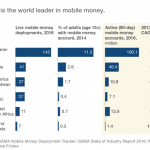A Devil’s Bargain to Bank the Unbanked: Why Financial Inclusion Advocates Shouldn’t Trust Facebook’s Libra
Financial inclusion, cryptocurrencies and blockchain. These three buzzwords are heard across the corridors of countless humanitarian and development organisations, and many seem to view them as the answer to all the problems facing both state and non-state actors in developing countries. Adding a new element to this panacea, Facebook and its Libra Association have now entered the arena, pitching a global cryptocurrency built on blockchain to promote financial inclusion.
Since its announcement on June 18 of this year, Libra has faced strong pushback from governments, policymakers and central banks. It has recently lost major members like eBay, PayPal, Mastercard and Visa. But despite this backlash, it’s forging ahead with its plans. On Oct. 15, the 21 initial members of the Libra Association formally signed the association charter, and Libra confirmed that over 1,500 entities have expressed interest in joining the project. According to a tweet from Libra, this is “a tremendous step toward global #financialinclusion.”
But to what extent should the financial inclusion community welcome Facebook’s newfound interest? And is Facebook the right entity to lead an effort of this magnitude?
Unintended Consequences
Facebook is, of course, not alone in its interest in establishing a widely used digital currency. Earlier this year, the Bank for International Settlements (BIS) published a paper, based on surveys conducted across 63 central banks worldwide, with the title “Proceeding with Caution – A Survey on Central Bank Digital Currency.” The central banks that responded are located in both emerging and developed economies, in countries that represent almost 80% of the world’s population and 90% of its economic output. The study found that about 70% of central banks are conducting research into central bank digital currency (CBDC) issuance, with roughly 50% currently running CBDC experiments or proof-of-concept activities.
But as the title of the paper suggests, they are aware of the risks of rushing through this process. Although most central banks are researching CBDCs, this work is primarily conceptual, and only a few intend to issue a CBDC in the short to medium term. The report concludes that “central banks are proceeding cautiously, and also that they are collaborating and sharing the results of their work. Caution and collaboration will reduce the likelihood of unintended consequences.”
It is these unintended consequences that we have not yet fully understood – and that’s why the development sector should take similar care when considering the role technologies like cryptocurrency and blockchain could play in their work with marginalized people. Each of these buzzwords needs untangling, as we explore how to apply them to local needs and opportunities. In this context, we cannot overlook the risks of the world’s most connected social media platform, Facebook, teaming up with equally big players from multiple private sector industries to leapfrog the more measured approaches to digital currency taken by the world’s central banks.
Our Love-Hate Relationship with Facebook
Digital technologies and innovations have brought incredible benefits to our world. Big data-driven companies like Facebook have promised a connected world where everyone will be included. Their technologies have helped bring us together, streamlining global communication and information sharing. In the process of popularizing their platforms, they have portrayed data as both a resource and a force of reason, allowing them to serve people without governmental interference or altruistic interventions. For a time, it seemed that the world would accept their binary ideology that everything can be captured by code, and that the platforms they were growing and the data they were generating were free of ambivalence.
But experience has shown otherwise. In recent years, we’ve seen a humanitarian crisis unfold in Myanmar, facilitated by the dissemination of hate propaganda on Facebook against the stateless community of Rohingyas. Today, UNHCR reports over 900 thousand refugees in Bangladesh, against a total estimated number of 1 to 1.3 million Rohingyas living in Myanmar before the crisis. We’ve seen Facebook harvest the personal data from millions of peoples’ profiles without their consent, for use in data-driven, targeted political campaigns, as revealed by the Cambridge Analytica scandal. We have witnessed radical leaders come to power with support from deceptive Facebook-based campaigns, in both emerging and developed countries.
It has become clear that the social impact of data-driven platforms like Facebook is both more nuanced, and more negative, than we originally understood. As Roger McNamee, an early investor in Facebook, explains, the algorithms used by these platforms are not value-neutral: Instead, they favour sensational content that maximises their share of users’ attention, which boosts profits but also disseminates unbalanced or incorrect information. Samuel C. Woolley and Philip N. Howard at Oxford University have explored how this can enable “computational propaganda,” through which bad actors employ “algorithms, automation and human curation to purposefully distribute misleading information over social media networks.” Yet though the platforms that facilitate this have taken some steps to address it, they also benefit from it: User engagement boosts their bottom line, whether it’s driven by legitimate news or disinformation campaigns. So the best interests of the company may not always be those of the consumer.
In light of this reality, have we fully understood the costs and benefits of leveraging data-driven tech platforms to meet the financial needs of the world’s most marginalised people? Are policymakers and regulators ready to integrate these changes into their systems? And can we really trust a consortium of private companies like the Libra Association, managed by a global player with an incredibly poor reputation for handling people’s data, and a history of receiving record-breaking fines for violating consumers’ privacy rights?
The Real Reason Facebook is Launching Libra
In our recent paper “Libra: Is it Really About the Money?” my co-author Geoffrey Goodell and I argue that Facebook is not being transparent about its real interest in Libra. In 2006, Clive Humby, British mathematician and architect of Tesco’s Clubcard (a supermarket reward program), coined the phrase: “Data is the new oil.” Facebook’s single-minded approach to gathering and monetizing its users’ data shows that it shares this belief. For that reason, Libra might best be seen not as a new financial service provider, but as a critical enabler for Facebook to acquire a new source of its lifeblood: personal data.
As we describe in the paper, Facebook’s role in the Libra Association would not be as the actual payment provider, but as the authentication provider. This role of authenticating a person’s identity according to global anti-money laundering rules provides an authentication provider with access to the unitary digital identity connected to users’ legal identity documents, such as passports. This is personal data with a level of accuracy that Facebook has not been able to acquire so far. Remember, on Facebook you can register with a pseudonym, after their real-name policy was heavily criticised in 2015. Without the certainty that a legal document, like a passport, can provide, Facebook needs to make extra effort to establish the identity of its users. Acquiring this type of unitary digital identity is a natural next step for the company, whose revenue model depends on convincing its advertising clients that they’re reaching the user groups they’re targeting. With Libra, Facebook is set to jump into the already fairly crowded space of companies wanting to establish and provide digital identity services. However, Facebook does so with a huge advantage: the over 2.7 billion existing users of their family of apps.
The Opportunity to Get it Right
As digital currency technologies continue to evolve, we must explore these topics further and enable policymakers to work toward a balanced system for all stakeholders. The recent uprising against Libra from EU countries like France and Germany is certainly welcome, and should send signals to state and non-state actors in the humanitarian and development world. But their reasoning might miss the point: It is either tied to the disbelief that Libra can manage the detection and prohibition of illicit payments, or based on fears that the Libra currency could be beyond the control of a central bank’s toolbox to stabilize the local economy.
Considering the real motivation behind Facebook’s intention to become an authentication provider, there are far deeper and more troubling implications. Namely, an unregulated, revenue-driven private player would take control of users’ most private and valuable data, gaining access to many of their personal transactions – and undoubtedly providing access to this dataset (along with any inferences deduced by Facebook’s algorithms) to various parties around the globe. And all this would happen beyond any individual’s reasonable expectations, understanding or control.
“Banking the unbanked” is Facebook’s major selling point for Libra, aligned naturally with the “social good” marketing campaign that the company has betrayed so many times already. But financial exclusion is a multi-dimensional issue with many causes and potential remedies. Cryptocurrencies and blockchain might be part of a valid solution, but it is dangerous to empower a wolf in sheep’s clothing to offer these solutions in exchange for open access to vulnerable customers’ most valuable personal data. Indeed, it is the very definition of a devil’s bargain.
Less-developed countries would be well-advised to be cautious, understand the risks at stake – and leave digital identity in the hands of legitimate and accountable authorities using open and auditable software.
Valerie Khan is Co-Founder and Vice President of Digital Equity.
Photo courtesy of Wikimedia Commons.
- Categories
- Finance, Technology



